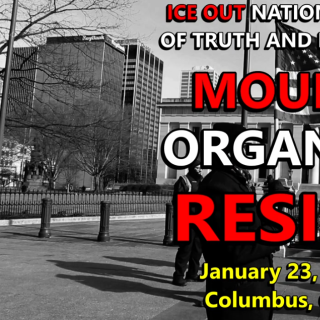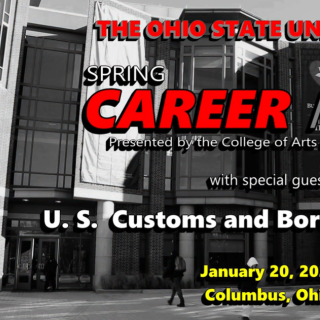In January of this year, a Columbus Charter Review Commission was appointed to review and recommend changes to our city charter that will go on the ballot this November. One of the proposed changes, which came from the City Attorney’s office, was going to make it even more difficult for citizen initiatives - true democracy of, by, and for the people - to get on the ballot. Well, I am happy to report that through grassroot, citizen advocacy, this was thwarted and better conditions were won that will make it easier for citizen initiatives to make the ballot in the future. The ultimate decision will be the Columbus voters on November 8th.
Thankfully, after my Dispatch Op-Ed and testimonies of committed activists fighting for true democracy, the Charter Review Commission decided to remove the additional signature requirement for citizen initiative proposed by the City Attorney's office involving city council districts that will take effect in 2023, even though they had first voted to accept it. During this amendment to the commission’s adopted charter changes, they recognized and stated that it would be burdensome to the initiative process.
The rights of initiative and referendum have been part of the Ohio Constitution since 1912 and the Columbus City Charter since 1914. These rights were won by a hard-fought struggle, led by Reverend Herbert Bigelow from Cincinnati, to empower Ohioans to be co-legislators, as a check and balance when elected officials are not acting in the public’s interests. Ohio is one of only 23 states with these rights, but they are getting weakened year by year.
Last November, a group called ProEnergy Ohio was responsible for placing Issue 7 on the ballot that would have diverted $87 million of city funds for so-called “green energy” projects. It was defeated by an unprecedented margin of 87% to 13%, however, city officials don’t really trust the voters to always make the “correct” decision, so they decided to craft language to alter the city charter to make it more difficult for, so-called, “self-dealing” measures to win passage.
When I first heard that a Charter Review Commission was to take place this year and that city official were most concerned with making changes to the charter because of Issue 7, I immediately thought to myself, “How will this be used to further squash citizen initiative and referendum in Columbus?” You see, Columbus has a history of being anti-citizen initiative. Well, my suspicions were correct. Not only was language submitted to the committee that would make it more difficult for so-called “self-dealing” measures to be approved by the electorate in the future, but an additional, unnecessary obstacle was proposed for all initiatives which would involve the nine city council districts to take effect next year.
The Charter Review Commission had seven meetings with city officials until the first public hearing. During these seven meetings, city officials had the commissioners as a captured audience presenting lengthy proposals crafted mostly in their favor. So, the process was heavily scripted and undemocratic. Ultimately, the commission had eleven regular meetings and only two public hearings! The process could have been designed so that the citizenry could have been involved from the very beginning, giving either support or caveats for the proposed charter changes suggested by city officials and recommending their own charter changes. I proposed that the commission recommend changing the process so that at the next charter review commission in 10 years - and at future ones - city officials would have to submit their proposed changes before the process begins and then the public could be involved from the very beginning. The commission neglected to take up my suggestion.
So, I and others testified at the two public hearings that the commission should not just adopt what city officials were proposing but must seriously consider adopting proposed charter changes coming from the public. We advocated for removing the one-year time limit for citizen initiative. For 100 years, prior to 2014, Columbus had no time limit on petitioning. There was no problem cited at that time or legitimate reason for the one-year limitation being placed on initiative. Also, no other city in Ohio, except Dayton, imposes any time limit - nor does the state - on the initiative process.
In Columbus, very few citizen-led initiatives have ever made it to the ballot. In fact, I am aware of only one initiated charter amendment to ever make the ballot and only a handful of initiated ordinances. This illustrates why it is already exceedingly difficult for citizens to exercise their constitutional right of initiative in Columbus. This is not only anti-democratic but a restriction on free speech whereby potentially creative and important reforms never make it to the electorate for consideration.
The local, grassroots group, Columbus Community Bill of Rights (CCBOR) – of which I am a member - was nine months into their fourth campaign having collected 9,000 signatures, and well on the way to meeting the valid signature requirement to make the ballot when, in March 2020, Covid disrupted our lives. CCBOR made the responsible decision to suspend their campaign and appealed to city council to allow them to resume the remaining three-month period of petitioning once it was deemed safe by health authorities. Council refused to grant any remedy, so the group’s campaign unjustly came to an end.
The Charter Review Commission considered this and decided to increase the one-year time limit for petitioning to two years which will appear on the November ballot. Of course, two years are better than one year but most big events for signature gathering that have occurred this year, like Comfest; Red, White, and Boom; and most recently, the Jazz and Ribfest; last occurred in 2019, three years ago. The city charter should provide time to account for either another deadly Covid variant, another pandemic, or some other unforeseen emergency that would make it unsafe and impractical to collect signatures.
Another recommendation presented to the commission was to grant a ten-day cure period to remedy a signature deficit once petitions are submitted if signatures are found insufficient. This is only a reasonable request, it is done at the state level, and it would benefit those initiatives that are short by a small number instead of having to start all over. Thankfully, this request was accepted and will also appear on the ballot in November as well.
There were other excellent recommendations involving the initiative process and other parts of the city charter that were presented during the two public hearings by myself, Joe Motil, Jon Beard, and others. Disappointedly, the commission did not even consider them.
So, in conclusion, we started with recommendations to our city charter that would have made it more difficult for citizen initiatives to make the ballot and now, through citizen advocacy, have two proposed city charter changes which will appear on the November ballot that will make it easier for future initiatives to reach the ballot.
In November, there will be three issues on the ballot regarding recommended Columbus City Charter changes. I have only commented on Columbus Proposed Charter Amendment No. 1 regarding the Initiative Process. I am making no comments regarding Columbus Proposed Charter Amendment No. 2 regarding Civil Service or Columbus Proposed Charter Amendment No. 3 regarding City Modernization. I leave it up to you to research those charter amendments.
----------------------
Bill Lyons is a co-organizer of Columbus Community Bill of Rights, a group which has petitioned for four initiatives to protect Columbus water from toxic and radioactive frack waste. He is also the president of the Ohio Community Rights Network.



